May 30, 2025 | 11:17 GMT +7
May 30, 2025 | 11:17 GMT +7
Hotline: 0913.378.918
May 30, 2025 | 11:17 GMT +7
Hotline: 0913.378.918
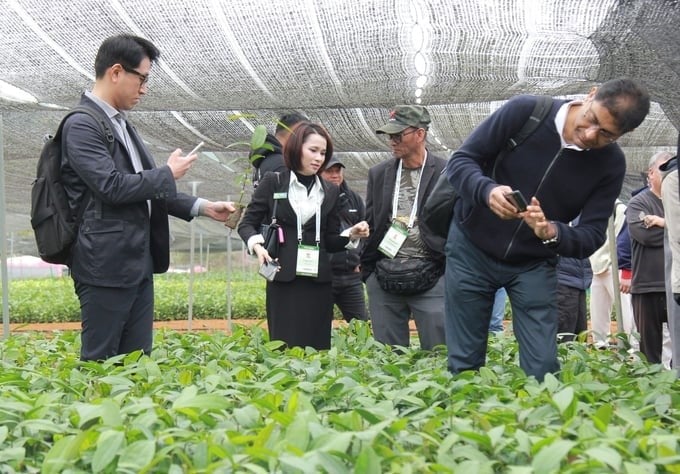
Many key agricultural products of Yen Bai province have been granted certificates of intellectual property protection, creating a favorable premise for export. Photo: Thanh Tien.
In 2023, the total agricultural, forestry, and fishery products of Yen Bai province increased by 5.29%, ranking in the top 10 nationwide, ranking 3rd among 14 Northern Midlands and Mountains provinces, and making an important contribution to the entire province's GRDP growth. The agricultural sector accounted for a GRDP proportion of 22.12%.
In the 2024 digital transformation plan, Yen Bai province continues to promote the development of the agricultural digital economy, bringing the province's agricultural products to e-commerce platforms and promoting the development of agricultural and rural digital economies in the 2021–2025 period.
Digital transformation aims to help the entire agricultural sector, farmer households, cooperatives, business households, and enterprises operating in the agricultural sector increase labor productivity, production, and business efficiency while promoting the province's socio-economic development. Yen Bai provine strives for the growth rate of total agricultural, forestry, and fishery products in 2024 to increase by 5.55% and the structure of total agricultural, forestry, and fishery products to reach 21% of the province's GRDP structure.
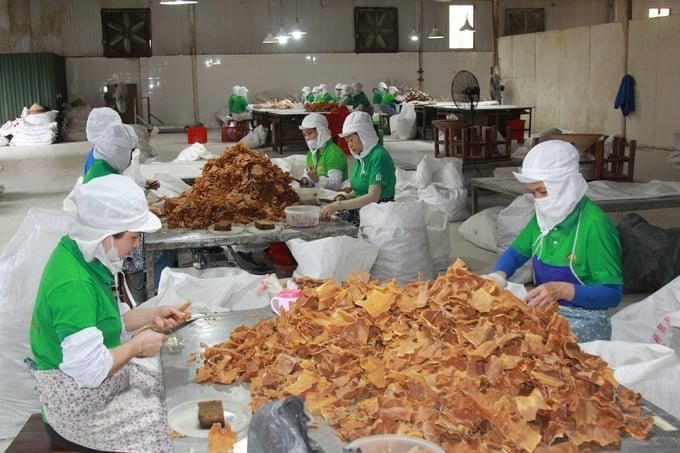
In 2023, the agricultural sector accounted for 22.12% of Yen Bai province's GRDP. Photo: Thanh Tien.
Mr. Nguyen Duc Dien, Deputy Director of the Yen Bai Department of Agriculture and Rural Development, said that the province's agricultural sector has coordinated with the Department of Information and Communications to advise the Provincial People's Committee to deploy to all departments, branches, districts, towns, and cities to implement communication work and organize seminars to consult experts to strongly promote the process of digital transformation in agriculture.
In recent times, Yen Bai province has focused on directing, organizing, and implementing digital transformation in the field of agricultural production management. Prioritize the development and protection of intellectual property for some of the locality's specific agricultural products in the form of geographical indications, certification marks, and collective marks.
Yen Bai has clearly formed large-scale concentrated and specialized commodity production areas with 10 key agricultural products, including grain foods, tea, fruit trees, main livestock, aquatic products, cinnamon, fructus crataegi, Bat Do bamboo shoots, mulberry, and raw wood. Many agricultural products have a high export value, such as cinnamon, tea, tapioca starch, bamboo shoots, and products from planted forest wood with export turnovers of tens of millions of dollars, accounting for 30–40% of the province's export turnover value.
As of now, the Intellectual Property Office has granted 50 certificates of intellectual property protection for the province's specialty products and key products. After being protected, products have enhanced their value and brand, helping increase income for people. Many products have established a solid foothold in the market and are known and trusted by domestic and foreign customers, such as Seng Cu Muong Lo rice, Bat Do bamboo shoot, Mu Cang Chai honey, Van Chan wattle-necked softshell turtle, Tu Le sticky rice, Suoi Giang Shan Tuyet tea, Dai Minh grapefruit, cinnamon products, tea, cattle, poultry, etc.
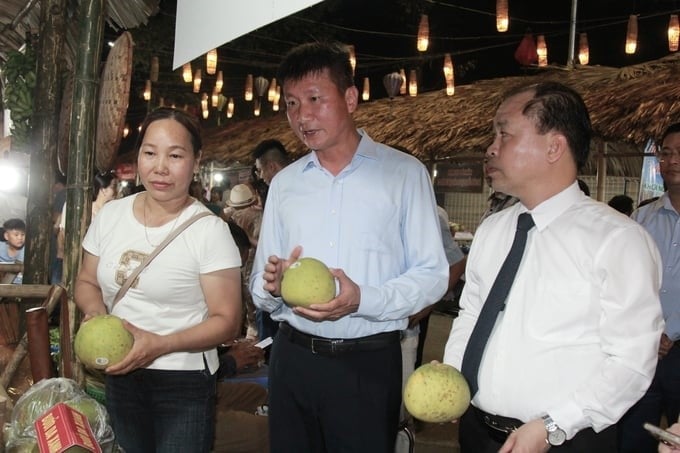
Dai Minh grapefruit is increasingly known to customers nationwide thanks to being recognized as an OCOP product and doing well in e-commerce promotion activities. Photo: Thanh Tien.
Over the past time, localities in the province have fully exploited indigenous resources along with processing techniques and technologies to create diverse, abundant, and quality OCOP products, contributing to increasing the value of agricultural products. As of now, the entire province has evaluated and certified over 230 OCOP products, including 25 4-star products and over 200 3-star products.
Yen Bai province has built and operated a software system to serve management and provide information about OCOP products. Issue many policies to support and promote enterprises, cooperatives, and cooperative groups to bring key products and OCOP products to e-commerce platforms. Support people in setting up online sales channels on official websites such as Facebook, TikTok, etc.
Besides, the entire province has currently issued 89 growing area codes, including 41 codes for export and 48 codes for domestic consumption. Yen Bai province considers the growing area code as one of the criteria to evaluate and recognize communes that meet advanced and model new-style rural standards.
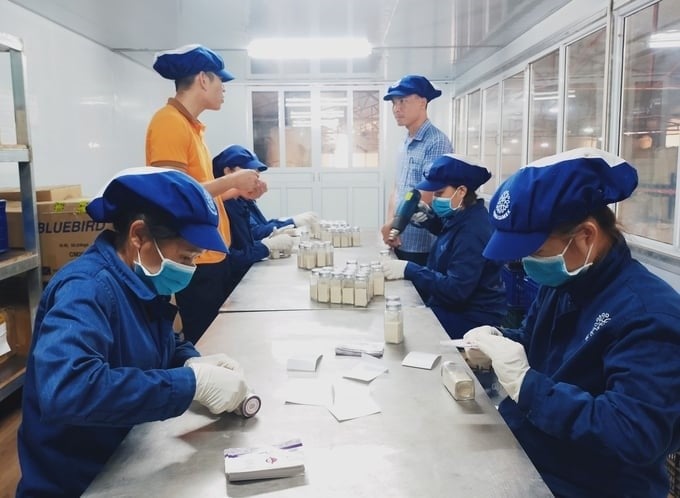
The cinnamon powder of the Vietnam Cinnamon-Star Anise Cooperative (Dao Thinh commune) is labeled for export to European countries. Photo: Thanh Tien.
Along with that, in specialized fields, the province has applied many digital transformation solutions, such as an environmental monitoring and warning system in aquaculture on Thac Ba Lake and an automatic rain measurement system in localities in the province to serve natural disaster warnings. Use and operate a MODIS remote sensing image collection station to detect, warn, and provide information about fire points to forest owners. Deploy and update the database on payments for forest environmental services in software; implement 100% payments for forest environmental services via bank accounts or other electronic transactions.
Enterprises, cooperatives, cooperative groups, and farmer households have also applied some digital transformation solutions in production, such as automatic watering systems, automatic feeding and drinking trough systems, monitoring, managing, and supervising livestock production with camera systems, etc.
Besides the achieved results, Yen Bai province still has some difficulties and obstacles in digital transformation in the agricultural sector. Specifically, the agricultural database system is not unified and complete, and there is a shortage of highly qualified human resources in information technology in the agricultural sector. In addition, people's ability to access and apply digital technology, especially in remote areas, is still limited. Support policies for enterprises and organizations applying digital technology to agriculture are not perfect.
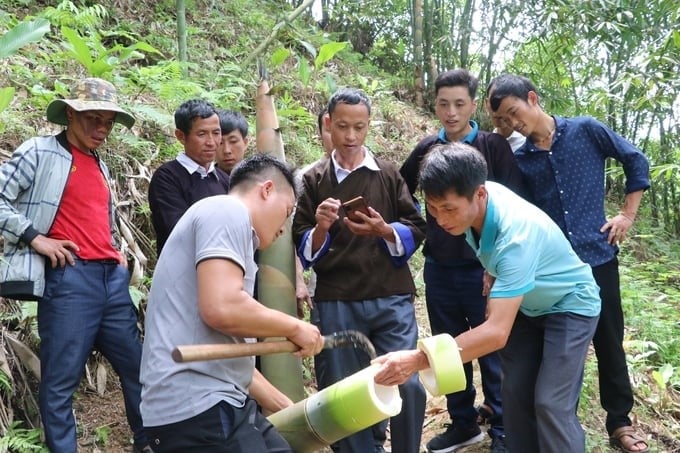
It is necessary to raise awareness among farmers about the role and benefits of applying digital technology to the management, production, and consumption of agricultural products. Photo: Thanh Tien.
Mr. Nguyen The Phuoc, Standing Vice Chairman of the Yen Bai Provincial People's Committee, said that the province identifies the task of promoting digitalization in the agricultural sector as an inevitable trend but also a new and difficult task, especially for mountainous areas like Yen Bai where socio-economic conditions and people's lives are still difficult. Therefore, to promote digitalization of the agricultural sector more effectively, Yen Bai province requested the Ministry of Agriculture and Rural Development to build and promulgate the Agricultural Data Architecture. Implement solutions to collect, manage, and use data effectively and synchronously, from weather monitoring and agricultural production management to marketing and consumption of agricultural products.
The Ministry of Agriculture and Rural Development and the Ministry of Information and Communications need to organize conferences, seminars, and agricultural extension models on the role and benefits of applying digital technology in the management, production, and consumption of agricultural products. On that basis, raise awareness among agricultural production and business entities, especially farmers, about digital transformation in agricultural production.
Translated by Thu Huyen

(VAN) The mutual export of agrifood products between the European Union (EU) and the United Kingdom (UK) must occur again without certification, border controls or other red tape. This was agreed at the UK-EU summit.
/2025/05/22/5121-2-173645_677.jpg)
(VAN) NBSAP Tracker identifies strengths and areas for improvement in the National Biodiversity Strategy, based on each region’s priorities and capacities.

(VAN) The draft amendment to the Circular on rice export trading stipulates a periodic reporting regime for rice exporting enterprises.

(VAN) Dong Thap farmers attained an average profit margin of 64% during the summer-autumn 2024 crop (first season), while An Giang and Kien Giang farmers followed with 56% and 54%, respectively.

(VAN) As a doctoral student doing research on renewable energy and electrification at Harvard University, the author shares his musings on electricity, nature, and countryside memories.

(VAN) The decree on Extended Producer Responsibility (EPR) ensures transparent management and disbursement of support funds, avoiding the creation of a “give-and-take” mechanism.

(VAN) Hue City rigorously enforces regulations regarding marine fishing and resource exploitation, with a particular emphasis on the monitoring of fishing vessels to prevent illegal, unreported, and unregulated (IUU) fishing.